|
Books Should Be Free Loyal Books Free Public Domain Audiobooks & eBook Downloads |
|
|
Books Should Be Free Loyal Books Free Public Domain Audiobooks & eBook Downloads |
|
Non-fiction |
|---|
|
Book type:
Sort by:
View by:
|
By: Sam R. Watkins (1839-1901) | |
|---|---|
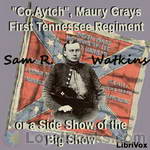 'Co. Aytch,' Maury Grays, First Tennessee Regiment or, A Side Show of the Big Show
'Co. Aytch,' Maury Grays, First Tennessee Regiment or, A Side Show of the Big Show
Samuel “Sam” Rush Watkins (June 26, 1839 – July 20, 1901) was a noted Confederate soldier during the American Civil War. He is known today for his memoir Company Aytch: Or, a Side Show of the Big Show, often heralded as one of the best primary sources about the common soldier's Civil War experience....Sam’s writing style is quite engaging and skillfully captures the pride, misery, glory, and horror experienced by the common foot soldier. Watkins is often featured and quoted in Ken Burns’ 1990 documentary titled The Civil War. (Introduction from Wikipedia) | |
By: Samuel Cheetham | |
|---|---|
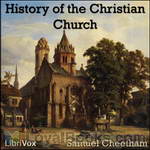 History of the Christian church
History of the Christian church
The intention of this work is to provide a sketch of the History of the Church in the first six centuries of its existence, resting throughout on original authorities, and also giving references to the principal modern works which have dealt specially with its several portions. It is hoped that it may be found to supply a convenient summary for those who can give but little time to the study, and also to serve as a guide for those who desire to make themselves acquainted with the principal documents from which the History is drawn. | |
By: Samuel D. Gordon (1859-1936) | |
|---|---|
 Quiet Talks on Prayer
Quiet Talks on Prayer
An open life, an open hand, open upward, is the pipe line of communication between the heart of God and this poor befooled old world. Our prayer is God’s opportunity to get into the world that would shut Him out. (From the first chapter) | |
 Quiet Talks about Jesus
Quiet Talks about Jesus
So far as I can find out, I have no theory about Jesus to make these talks fit into. I have tried to find out for myself what the old Book of God tells about Him. And here I am trying to tell to others, as simply as I can, what I found. It was by the tedious, twisting path of doubt that I climbed the hill of truth up to some of its summits of certainty. I am free to confess that I am ignorant of the subject treated here save for the statements of that Book, and for the assent within my own spirit to these statements, which has greatly deepened the impression they made, and make... | |
By: Samuel Gordon (1871-1927) | |
|---|---|
 Sons of the Covenant: A Tale of London Jewry
Sons of the Covenant: A Tale of London Jewry
Born in London's poverty-stricken and heavily Jewish East End, the Lipcott boys create their own successes in life and love. The brothers' commitment to improving the lives of working class people leads them to concoct The Scheme to help both the residents of their former neighbourhood and the Jewish people as a whole. The author stresses the responsibility of middle class Jews toward the Jewish poor. Consequently, this 1900 story has its preachy moments as well as some essentialised speculations about Jewish history and character... | |
By: Samuel H. Goodwin (1862-1951) | |
|---|---|
 Mormonism and Masonry
Mormonism and Masonry
The edition of the book published in 1921 explored extensively the reasons why Mormons were not accepted ("are" at the time of publication) into the Masonic Lodges. | |
By: Samuel Hopkins Hadley (1842-1906) | |
|---|---|
 Down In Water Street
Down In Water Street
Written by the Superintendent of the Jerry McAuley Water Street Mission, "Down in Water Street" is intended to share some of the experiences the writer had during his sixteen years of service to the Mission. Hadley's intent was to show "how some success has been achieved, and also mention some of our defeats; for we found long years ago that we often learn more in defeat than in victory." - Summary by Kristin Hand with a quote from the Preface | |
By: Samuel Johnson | |
|---|---|
 Plan and Preface to a Dictionary of English
Plan and Preface to a Dictionary of English
The published dictionary was a huge book: with pages nearly 1½ feet tall and 20 inches wide, it contained 42,773 words; it also sold for the huge price of £4/10s. ($400?). It would be years before “Johnson’s Dictionary”, as it came to be known, would ever turn a profit; authors’ royalities being unknown at that time, Johnson, once his contract to deliver the book was fulfilled, received no further monies connected to the book. Johnson, once again a freelance writer, albeit now a famous one, faced a grim hand-to-mouth existence; however, in July 1762 the twenty-four year old King George III granted Johnson an annual pension of £300... | |
By: Samuel Smiles (1812-1904) | |
|---|---|
 Lives of the Engineers (George and Robert Stephenson)
Lives of the Engineers (George and Robert Stephenson)
George Stephenson did not invent the steam engine, that was due to Newcomen and later to James Watt. He did not invent the steam locomotive, that was due to a number of people including Cugnot, Trevithick and others. He did not invent the Railway. Railways or tramways had been in use for two hundred years before Stephenson.The reason why Stephenson was known as ‘The father of the steam locomotive’ was that he took a primitive, unreliable and wholly uneconomic device and turning it into an efficient... | |
By: Santa Teresa de Jesus (1515-1582) | |
|---|---|
 The Life of St. Teresa
The Life of St. Teresa
Saint Teresa of Ávila, also called Saint Teresa of Jesus, baptized as Teresa Sánchez de Cepeda y Ahumada, (March 28, 1515, at Gotarrendura (Ávila), Old Castile, Spain – October 4, 1582, at Alba de Tormes, Salamanca, Spain) was a prominent Spanish mystic, Carmelite nun, and writer of the Counter Reformation. She was a reformer of the Carmelite Order and is considered to be, along with John of the Cross, a founder of the Discalced Carmelites. In 1970 she was named a Doctor of the Church by Pope Paul VI. | |
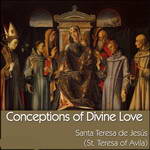 Conceptions of Divine Love
Conceptions of Divine Love
Conceptions of Divine Love was written in 1577. St. Teresa wrote this with the idea of explaining certain words found in the Book of Canticles. When her confessor read the title of her work, he ordered her to immediately burn it, which, of course, she did. But one of her nuns had copied the first seven chapters, which was then published in 1612. Here, Father John Dalton has translated only four of those chapters in 1852. | |
By: Santa Teresa de Jesus (Avila) (1515-1582) | |
|---|---|
 The Way of Perfection
The Way of Perfection
El Camino de Perfección (trans.: The Way of Perfection) is a method for making progress in the contemplative life written by St. Teresa of Ávila for the sisters of her reformed convent of the Carmelite Order (Discalced). St. Teresa was a major figure of the Catholic Reformation in 16th Century Spain. | |
By: Sara Cone Bryant (1873-?) | |
|---|---|
 How to Tell Stories to Children, and Some Stories to Tell
How to Tell Stories to Children, and Some Stories to Tell
Sara Cone Bryant was an educator and storyteller who wrote several books on the importance of oral storytelling to children, and stories to tell children. This volume expounds on her theories and practices of telling stories to children, and provides several examples. Her conversational writing style makes this work as relevant for parents and teachers as it was 90 years ago. | |
By: Sara Ware Bassett (1872-1968) | |
|---|---|
 Story of Wool
Story of Wool
Mr. Clark and Donald spend a year out west to the Crescent Ranch in Idaho learning about raising sheep. | |
By: Sarah E. Trueblood (1849-1918) | |
|---|---|
 Cats by the Way
Cats by the Way
Between these pages you will find only the good, old-fashioned, every-day cat. No Angora or thoroughbred has been entered here, unless it be "Hansie," who is little more than mentioned. These are true incidents and true lives, with the exception of the one chapter, "The Mission of the Cat." The reader will pardon the intrusion of Victor, the dog. I have added him as the cook adds her trace of spice, but feeling also that he is entirely in place, being an ardent cat-lover himself. | |
By: Sarah Elizabeth Harper Monmouth (1829-1887) | |
|---|---|
 Living on Half a Dime a Day
Living on Half a Dime a Day
How to live on 5 cents a day! How to survive financial ruin without losing your house! How to keep to a bare bones budget and still have money left over to buy books! Tough questions! They were tough questions even in the 1870’s, when Sarah Elizabeth Harper Monmouth penned her quirky memoir, the subtitle of which was “How a Lady, Having Lost a Sufficient Income from Government Bonds by Misplaced Confidence, Reduced to a Little Homestead Whose Entire Income is But .00 per Annum, Resolved to Hold It, Incurring no Debts and Live Within it... | |
By: Sarah Knowles Bolton | |
|---|---|
 Lives of Girls Who Became Famous
Lives of Girls Who Became Famous
This book is a collection of short biographies of notable women, including Harriet Beecher Stowe, Louisa May Alcott, Florence Nightingale, and many others. | |
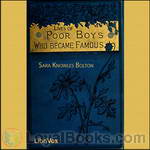 Lives of Poor Boys Who Became Famous
Lives of Poor Boys Who Became Famous
These characters have been chosen from various countries and from varied professions, that the youth who read this book may see that poverty is no barrier to success. It usually develops ambition, and nerves people to action. Life at best has much of struggle, and we need to be cheered and stimulated by the careers of those who have overcome obstacles.If Lincoln and Garfield, both farmer-boys, could come to the Presidency, then there is a chance for other farmer-boys. If Ezra Cornell, a mechanic, could become the president of great telegraph companies, and leave millions to a university, then other mechanics can come to fame... | |
 Famous American Statesmen
Famous American Statesmen
A sketch of the lives of some of America's early Statesmen: George Washington, Benjamin Franklin, Thomas Jefferson, Alexander Hamilton, Andrew Jackson, Daniel Webster, Henry Clay, Charles Sumner, Ulysses S. Grant, and James A. Garfield. | |
By: Sarah Morgan Dawson (1842-1909) | |
|---|---|
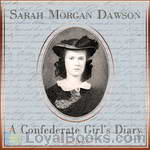 A Confederate Girl's Diary
A Confederate Girl's Diary
Sarah Morgan Dawson was a young woman of 20 living in Baton Rouge, Louisiana, when she began this diary. The American Civil War was raging. Though at first the conflict seemed far away, it would eventually be brought home to her in very personal terms. Her family's loyalties were divided. Sarah's father, though he disapproved of secession, declared for the South when Louisiana left the Union. Her eldest brother, who became the family patriarch when his father died in 1861, was for the Union, though he refused to take up arms against his fellow Southerners... | |
By: Selina Gaye (1840-1914) | |
|---|---|
 The World's Lumber Room
The World's Lumber Room
If this book were written today, it would be called "The Story of the World's Rubbish".That may not sound a promising subject for a book, but we are taken on a journey all over the world (and beyond) to explain the many varieties of dust and refuse - animal, vegetable and mineral - how it is made both by man and by nature, what happens to it, and why we need it. We find that recycling is nothing new: man has been doing it for centuries, and nature has been doing it for billions of years. As every schoolboy knows, 'matter is neither created nor destroyed', so it stands to reason that every particle of it must be somewhere... | |
By: Shaykh Hasan | |
|---|---|
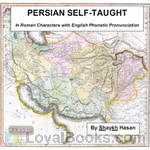 Persian Self-Taught (in Roman Characters) with English Phonetic Pronunciation
Persian Self-Taught (in Roman Characters) with English Phonetic Pronunciation
This volume is primarily intended to supply a working and practical knowledge of the Persian language, for the benefit of those who have not the time or the inclination to master the grammar, and yet require to use the spoken tongue for purposes of business or pleasure. With this object in view it supplies many vocabularies of words carefully selected to suit the needs of those holding communication with Persia and the Persians, classified according to subject, and a large number of colloquial phrases... | |
By: Sheikh Nefzaoui | |
|---|---|
 The Perfumed Garden
The Perfumed Garden
A fifteenth-century Arabic sex manual and work of erotic literature. The book presents opinions on what qualities men and women should have to be attractive, gives advice on sexual technique, warnings about sexual health, and recipes to remedy sexual maladies. It gives lists of names for the penis and vagina, has a section on the interpretation of dreams, and briefly describes sex among animals. Interspersed with these there are a number of stories which are intended to give context and amusement. | |
By: Sidford Frederick Hamp (1855-1919) | |
|---|---|
 Coco Bolo: King of the Floating Island
Coco Bolo: King of the Floating Island
Sisters Margaret and Frances wait for their younger brother Edward to go for a nap before embarking on the adventure of trying to stand on the heads of their shadows. Daddy sees them and encourages them to chase further adventures of childhood, little suspecting where they will take them. - Summary by Lynne Thompson | |
By: Sidney Licht (1907-1979) | |
|---|---|
 Music in Medicine
Music in Medicine
In spite of a spirited rebirth of the movement towards the establishment of a system of healing based on music, there are many valuable uses of music in medicine which might suffer a like fate unless a critical analysis of the worth of music as a therapeutic agent is effected before Musical Therapy reaches the dubious distinction of classification as a healing cult. This book has been written with a view to preserving for medicine that which is good for patients, and in an attempt to aid musicians under medical guidance in using music to help the sick. | |
By: Sigmund Freud | |
|---|---|
 Reflections on War and Death
Reflections on War and Death
Anyone, as Freud tells us in Reflections on War and Death, forced to react against his own impulses may be described as a hypocrite, whether he is conscious of it or not. One might even venture to assert—it is still Freud’s argument—that our contemporary civilisation favours this sort of hypocrisy and that there are more civilised hypocrites than truly cultured persons, and it is even a question whether a certain amount of hypocrisy is not indispensable to maintain civilisation. When this... | |
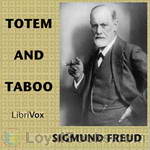 Totem and Taboo
Totem and Taboo
Totem and Taboo: Resemblances Between the Mental Lives of Savages and Neurotics is a book by Sigmund Freud, published in German in 1913. It is a collection of four essays first published in the journal Imago (1912–13), employing the application of psychoanalysis to the fields of archaeology, anthropology, and the study of religion. The four essays are entitled: The Horror of Incest; Taboo and Emotional Ambivalence; Animism, Magic and the Omnipotence of Thoughts; and The Return of Totemism in Childhood. | |
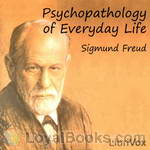 Psychopathology of Everyday Life
Psychopathology of Everyday Life
Professor Freud developed his system of psychoanalysis while studying the so-called borderline cases of mental diseases, such as hysteria and compulsion neurosis. By discarding the old methods of treatment and strictly applying himself to a study of the patient's life he discovered that the hitherto puzzling symptoms had a definite meaning, and that there was nothing arbitrary in any morbid manifestation. Psychoanalysis always showed that they referred to some definite problem or conflict of the person concerned... | |
 Interpretation of Dreams
Interpretation of Dreams
A neat book on dream analysis by the founding father of psychoanalysis. This book is about the inner theater and the workings of the mind in the dreaming state. Covering lots of topics, the Austrian psychoanalyst's work on dreams is worth reading for anyone who would get up with a question mark face, trying to remember the dream they had just moments before and trying to understand what message their dream was conveying, if at all it was. | |
 Origin and Development of Psychoanalysis
Origin and Development of Psychoanalysis
A series of lectures given in the USA by Freud in German, later translated into English - Summary by Peter Tucker | |
By: Sinclair Lewis | |
|---|---|
 The Trail of the Hawk
The Trail of the Hawk
| |
By: Sir Arthur Cotton (1803-1899) | |
|---|---|
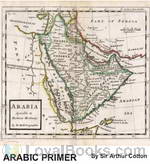 Arabic Primer
Arabic Primer
“Languages”, Sir Arthur Cotton writes, “are usually learnt as if it took a long time to learn the grammar &c., but that to speak with a good pronunciation and expression, and freely, and to catch the words from a speaker by the ear were easily and quickly acquired, but this is exactly contrary to fact.” Cotton’s “Vocal system” differs from the traditional grammatical method of learning languages in that it emphasises the development of correct pronunciation and the gradual acquisition of correct expressions and vocabulary... | |